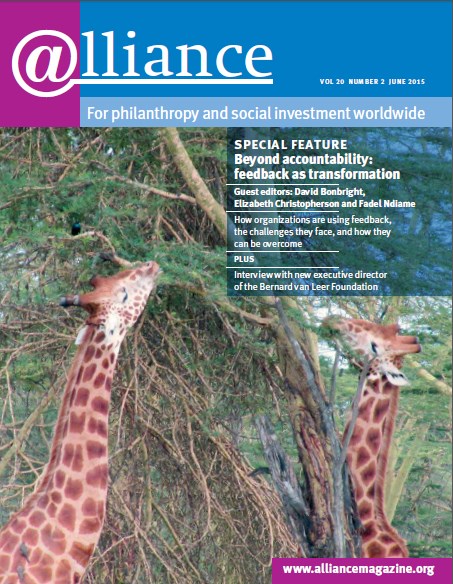While millions of philanthropic dollars pour into Africa annually, billions of dollars in illicit financial flows (IFFs) leak out of the continent, mostly back to the global north. It’s like trying to fill a leaking bucket. What role can philanthropy play in stopping the leak and countering the real threat to development gains posed by IFFs?
Generally defined as ‘money that is illegally earned, transferred or used’, IFFs cost Africa an estimated $60 billion annually, according to figures from the recently released Final Report of the High Level Panel on IFFs from Africa, with another estimate putting the total over the last 30 years as high as $1.4 trillion. Not only is this a huge amount, it is also increasing at the alarming rate of over 20 per cent per annum according to GFI (Global Financial Integrity) figures.
Commercial activity, especially in the extractive natural resources sector, is the main culprit, particularly through trade mis-invoicing – the practice of misrepresenting the price or quantity of imports or exports in order to hide or accumulate money in other countries. In this way, companies, especially multinationals, evade taxes and customs duties, transfer kickbacks and launder money. The United Nations Economic Commission on Africa (UNECA) estimates that between 2001 and 2010 African countries lost up to $407 billion from trade mispricing alone. The particular vulnerability of the natural resources sector to IFFs goes a long way to explain the limited translation of Africa’s abundant natural resources wealth into development outcomes. It also helps explain the paradox of rising numbers of people living in poverty, from 219 million in 1990 to 441 million in 2010, according to UNECA, while trade and foreign direct investment boom.
‘Companies, especially multinationals, evade taxes and customs duties, transfer kickbacks and launder money.’
Further, by undermining domestic resource mobilization, IFFs create dependence on outside resources and vulnerability to the unfair conditions usually tied to development assistance, foreign loans and foreign direct investment. This dependence, in turn, often results in additional crippling capital outflows from the continent. For instance, according to Health Poverty Action, $21 billion leaves Africa annually in debt repayments, mostly for loans contracted under unfavourable conditions.
Untangling the web of connections between philanthropy and IFFs is not easy as the connections are in most cases neither obvious nor direct. However, there is an obvious link in the case of philanthropic money that comes from the profits of a corporation which is engaged in IFFs. The money that comes back as philanthropic dollars in these cases, whether through foundations or CSR, is a pittance compared to what is lost through IFFs. Another evident connection arises where philanthropic institutions invest in stock or equity in companies that are engaged in IFFs. This applies also in cases of impact investing.
The issue of net resource flows, financial and otherwise, from Africa to the global north arises from historical structural distortions and unjust economic relations that have prioritized corporate profit at the expense of local benefits, particularly in an era of financial deregulation, weak states and unchecked corporate power. Another link between philanthropy and IFFs is forged when philanthropy promotes the kind of financial deregulation and marketization that readily permits IFFs.
The sustainable development of Africa depends on stopping this haemorrhage of IFFs from the continent. Philanthropy can play a part by avoiding investment decisions where philanthropy money fuels IFFs. More importantly, it can also directly support efforts towards maximizing local benefits from the exploitation of Africa’s natural resources and help stop leaks.
Stopping IFFs ultimately requires policy changes. It is therefore important for funders to invest in movement building to raise the issue outside specialist circles, mobilize key constituencies, and bring people power to bear on national, regional and international leaders and institutions to implement effective policies to stop IFFs. Key opportunities for funder involvement that TrustAfrica is currently investing in include research to help inform advocacy and policymaking; convenings and networking to facilitate strategy coordination and collaboration among CSOs and other relevant actors; and advocacy for specific policy demands to relevant policymakers.
Briggs Bomba is a programme officer at TrustAfrica. Email bomba@trustafrica.org







Comments (0)